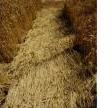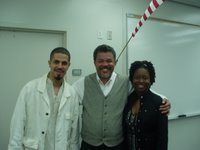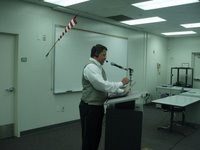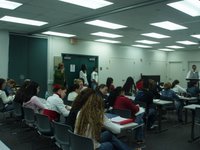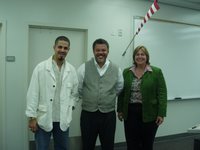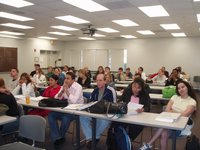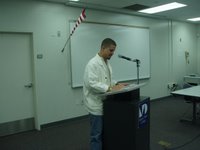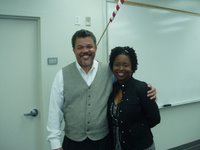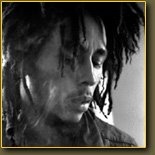 Dear Mr. Winkler:
Dear Mr. Winkler:Greetings and Happy Birthday!
Since my earliest introduction to your work in the memoir, Going Home to Teach, I have been following your writing career by reading back to your first novel, The Painted Canoe, and forward to The Duppy. (I’ve also used your textbook co-authored with Jo Ray McCuen, From Idea to Essay, for as long as I taught freshman composition). In fact, I was elated when The Caribbean Writer asked me to review your latest collection of short stories, The Annihilation of Fish and Other Stories. (As if they had to twist my arm. It was already on my list of books to read). So, given your vast experience in writing in so many genres, plays, novels, memoirs, short stories, and textbooks, I fear you may be tempted to undertake a manual for creative writing. Don’t. Not that I have any doubts that if wouldn’t be excellent, it would merely be redundant. The Annihilation of Fish and Other Stories, as well as your other novels, if read correctly by any would-be writer is more than she will ever need in handling character, plot, setting, tone and theme. And for the readers, sheer delight. For it’s as if you have followed Robert Frost’s idea about poems and applied it to your writing: “A poem should begin with delight and end with wisdom”. And there is a lot of pleasure and perceptivity in this small book that speaks volumes about the Jamaican character about which you write so lovingly while at the same time skewering our deepest foibles and flaws.
From “The Preliminary Report” to the title story, we meet a cast of characters who could only have sprung from the Jamaican soil: Inspector Jordan Hall’s class prejudice and contempt for his own people whom he labels as “Butu”: “I’m aware that Headquarters frowns on the use of “Butu” to indicate a certain lower class of Jamaicans, but this being only a preliminary report, I’ve taken some liberties with vocabulary” (1); Rachel Higgins and her husband’s fear of “unconventionality”; and Fish’s (and indeed many of the other characters) unquestioning acceptance of the side-by-side existence of this world with other dimensions. As I read the stories, I also realized there must be some deep vein of sadism buried in me because I enjoyed the torment you inflicted on these characters (albeit with certain self-consciousness) because I realized that I shared many of their beliefs. Through the deftness of your description, witty dialogue, and truncated exposition, you created characters whose beliefs about the world created their dilemmas and as they acted on these beliefs, the essential absurdity of the climax came so easily that a young writer (because she is laughing so hard—but it’s also nervous laughter) might miss the craft on display.
And then there’s the wisdom in stories such as, “The Story of the Fifth Boy” that uncovers the Jamaican fear of “softness”: “Jamaican boys fear gentleness. When gentleness appears among them, they crush it as they would a cockroach” (15); “The Cultivator Who Lost His Heart” and “The Riddle” unearth the existential crisis that every human faces (similar to Hemingway’s nada) in a Jamaican setting, “dat is better to pretend dat nothing is something dan to believe dat everything is nothing” (105); our fear of success in “The Dog” and what Matthew Arnold would have called “philistinism” in “The Chance”: “Like many Jamaicans, his whole aim in life was to work hard for material betterment” (51). There are, however, two other stories that I enjoyed which have to do with some of my own concerns: “New Banana” and ‘The Interpreter”. In both these stories, the main characters’, Hopeton Munroe Uppinton and Gabriel Yap Sang, attempts at establishing singular identities—naming themselves on their own terms-- are stymied by their antagonists. In Hopeton’s case, crass American tourists and in Gabriel’s, his community. In both these stories, the theme which was captured in the story “Unconventionality” highlights one of the deepest fears of Jamaicans-- being called in the terms of my adolescence, “extra”. This fear of being viewed as uncommon/unusual/different (no doubt born from our collective experience of slavery/ colonialism which during those times would have certainly lead to an early death--but we need to get over it) supplies much of the guilt ridden anxiety of the characters and our people. In order to escape the dilemma, many of us, like Gabriel Yap Sang have rejoined the community, sacrificed our individuality and opted for mediocrity. Hopeton chooses murder.
Of course, I could continue with the themes in the other stories that I loved: the theological dissonance in “The Preliminary Report” that you extended in the novel, The Duppy and the longing to return to Jamaica in “The Absentee Ownership of Cows” which you developed in the play, The Burglary. Perhaps, the only difficulty that I had with the collection was that most of the protagonists were elderly, like the couple in “The Trip to Paris,” and seemed to have wasted their lives (although the were much better off materially than if they had stayed on the island) by living abroad and losing their connection with the land. Damned if you do, damned if you don’t.
Even the cover of the book with Fish, his frail hands cupped into an arthritic fist while he sports the uniform of elderly Jamaican men, Banlon shirt and polyester pants, captures the warrior spirit for which we are known. It also depicts the ferocity and the farce of many of our lives. The portrait of this aging, pugilistic Jamaican is apt for this collection, and if I were to rate this collection the way a boxer’s career is judged, then you could retire undefeated, for every story is a knockout.
Yours truly,
Geoffrey Philp
Miami, Florida
PS. This letter was first published in The Caribbean Writer. For a review of my favorite Winkler book, The Duppy, follow this link for my review(s) on Amazon: The Duppy
Books
Writing and Poetry
Fiction
Caribbean Writers

